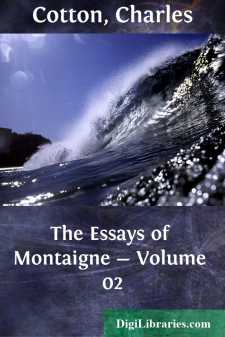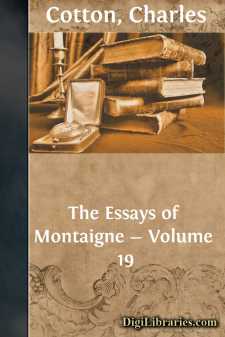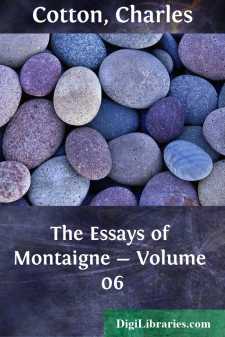Categories
- Antiques & Collectibles 13
- Architecture 36
- Art 48
- Bibles 22
- Biography & Autobiography 813
- Body, Mind & Spirit 142
- Business & Economics 28
- Children's Books 17
- Children's Fiction 14
- Computers 4
- Cooking 94
- Crafts & Hobbies 4
- Drama 346
- Education 46
- Family & Relationships 57
- Fiction 11829
- Games 19
- Gardening 17
- Health & Fitness 34
- History 1377
- House & Home 1
- Humor 147
- Juvenile Fiction 1873
- Juvenile Nonfiction 202
- Language Arts & Disciplines 88
- Law 16
- Literary Collections 686
- Literary Criticism 179
- Mathematics 13
- Medical 41
- Music 40
- Nature 179
- Non-Classifiable 1768
- Performing Arts 7
- Periodicals 1453
- Philosophy 64
- Photography 2
- Poetry 896
- Political Science 203
- Psychology 42
- Reference 154
- Religion 513
- Science 126
- Self-Help 84
- Social Science 81
- Sports & Recreation 34
- Study Aids 3
- Technology & Engineering 59
- Transportation 23
- Travel 463
- True Crime 29
The Essays of Montaigne - Volume 15
by: Charles Cotton
Categories:
Description:
Excerpt
By how much profitable thoughts are more full and solid, by so much are they also more cumbersome and heavy: vice, death, poverty, diseases, are grave and grievous subjects. A man should have his soul instructed in the means to sustain and to contend with evils, and in the rules of living and believing well: and often rouse it up, and exercise it in this noble study; but in an ordinary soul it must be by intervals and with moderation; it will otherwise grow besotted if continually intent upon it. I found it necessary, when I was young, to put myself in mind and solicit myself to keep me to my duty; gaiety and health do not, they say, so well agree with those grave and serious meditations: I am at present in another state: the conditions of age but too much put me in mind, urge me to wisdom, and preach to me. From the excess of sprightliness I am fallen into that of severity, which is much more troublesome; and for that reason I now and then suffer myself purposely a little to run into disorder, and occupy my mind in wanton and youthful thoughts, wherewith it diverts itself. I am of late but too reserved, too heavy, and too ripe; years every day read to me lectures of coldness and temperance. This body of mine avoids disorder and dreads it; 'tis now my body's turn to guide my mind towards reformation; it governs, in turn, and more rudely and imperiously than the other; it lets me not an hour alone, sleeping or waking, but is always preaching to me death, patience, and repentance. I now defend myself from temperance, as I have formerly done from pleasure; it draws me too much back, and even to stupidity. Now I will be master of myself, to all intents and purposes; wisdom has its excesses, and has no less need of moderation than folly. Therefore, lest I should wither, dry up, and overcharge myself with prudence, in the intervals and truces my infirmities allow me:
"Mens intenta suis ne seit usque malis."
["That my mind may not eternally be intent upon my ills."
—Ovid., Trist., iv. i, 4.]
I gently turn aside, and avert my eyes from the stormy and cloudy sky I have before me, which, thanks be to God, I regard without fear, but not without meditation and study, and amuse myself in the remembrance of my better years:
"Animus quo perdidit, optat,
Atque in praeterita se totus imagine versat."
["The mind wishes to have what it has lost, and throws itself
wholly into memories of the past."—Petronius, c. 128.]
Let childhood look forward and age backward; was not this the signification of Janus' double face? Let years draw me along if they will, but it shall be backward; as long as my eyes can discern the pleasant season expired, I shall now and then turn them that way; though it escape from my blood and veins, I shall not, however, root the image of it out of my memory:
"Hoc est
Vivere bis, vita posse priore frui."
["'Tis to live twice to be able to enjoy one's former life again."
—Martial, x. 23, 7.]
Plato ordains that old men should be present at the exercises, dances, and sports of young people, that they may rejoice in others for the activity and beauty of body which is no more in themselves, and call to mind the grace and comeliness of that flourishing age; and wills that in these recreations the honour of the prize should be given to that young man who has most diverted the company. I was formerly wont to mark cloudy and gloomy days as extraordinary; these are now my ordinary days; the extraordinary are the clear and bright; I am ready to leap for joy, as for an unwonted favour, when nothing happens me. Let me tickle myself, I cannot force a poor smile from this wretched body of mine; I am only merry in conceit and in dreaming, by artifice to divert the melancholy of age; but, in faith, it requires another remedy than a dream. A weak contest of art against nature. 'Tis great folly to lengthen and anticipate human incommodities, as every one does; I had rather be a less while old than be old before I am really so.' I seize on even the least occasions of pleasure I can meet. I know very well, by hearsay, several sorts of prudent pleasures, effectually so, and glorious to boot; but opinion has not power enough over me to give me an appetite to them. I covet not so much to have them magnanimous, magnificent, and pompous, as I do to have them sweet, facile, and ready:
"A natura discedimus; populo nos damus,
nullius rei bono auctori."
["We depart from nature and give ourselves to the people, who
understand nothing."—Seneca, Ep., 99.]
My philosophy is in action, in natural and present practice, very little in fancy: what if I should take pleasure in playing at cob-nut or to whip a top...!












